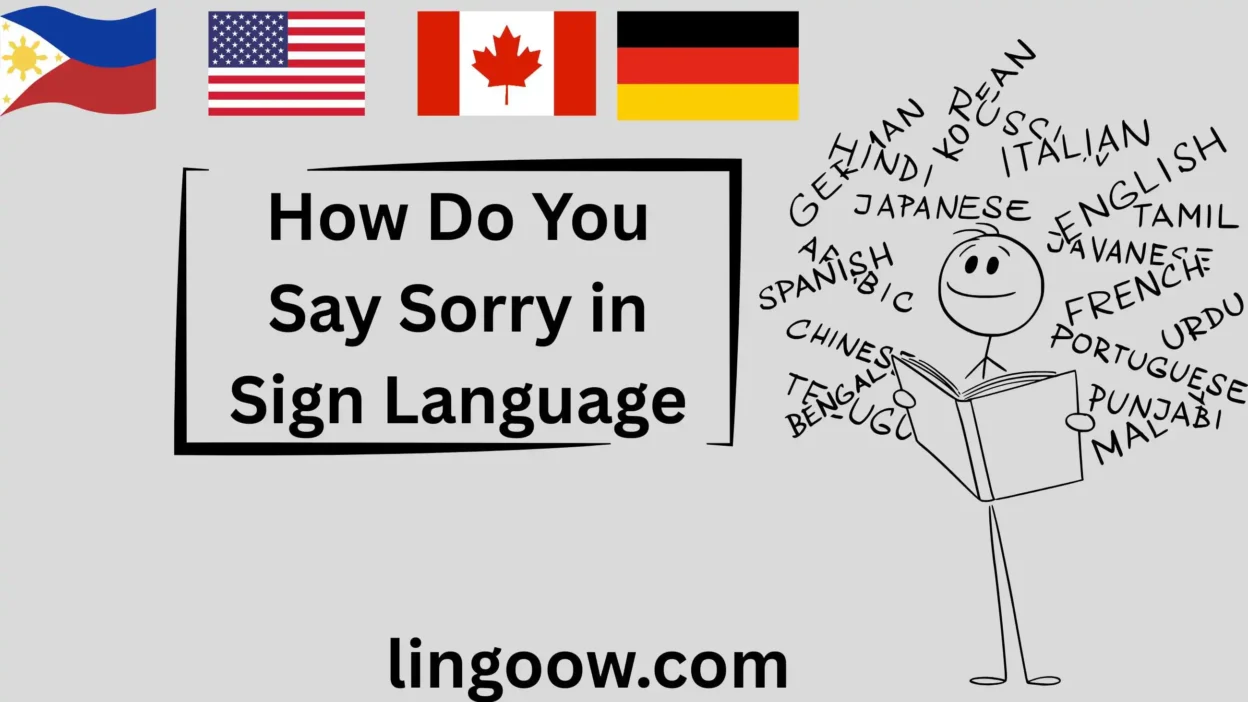Imagine this: You’re in a bustling market in Tokyo, accidentally bumping into an older woman. Your heart sinks. Words tumble out in English—”I’m so sorry!”—but she smiles faintly, bows slightly, and walks on.
In that moment, you realize apology isn’t just words; it’s a bridge across human mishaps. Now, pivot to a deaf friend in your hometown. You knock over their coffee, and instead of speaking, your hands form a gentle fist circling over your chest. They nod, forgiven.
That simple sign language gesture for “sorry” packs the same emotional punch as any spoken word. Across cultures, “sorry” (or its equivalent) is our universal reset button—admitting fault, seeking harmony, and mending bonds.
Whether voiced, signed, or gestured, it reminds us that vulnerability unites us all. Today, let’s explore how the world says “sorry,” from spoken tongues to silent signs, celebrating its power to heal.
Quick Reference Table: “Sorry” in 15 Languages
| Language | Word/Phrase for “Sorry” | Cultural/Linguistic Insight |
| American Sign Language (ASL) | Fist in circular motion over chest | Emphasizes heartfelt regret; non-verbal, focuses on sincerity through eye contact and expression. |
| British Sign Language (BSL) | Open hand tapping chest | Similar to ASL but with regional variations; used in deaf communities to convey personal accountability. |
| French Sign Language (LSF) | Hand to mouth, then away | Rooted in French culture’s emphasis on politeness; often paired with a bow-like nod. |
| Japanese Sign Language (JSL) | Hands clasped, bowing motion | Mirrors spoken apologies with deep bows; humility is key in Japanese deaf culture. |
| Chinese Sign Language (CSL) | Palm to chest, slight bow | Reflects Confucian values of harmony; signs are iconic and efficient. |
| French | Pardon / Excusez-moi | “Pardon” for minor faults; formal “excusez-moi” shows respect in hierarchical society. |
| Spanish | Lo siento | Literally “I feel it”; emotional, tied to Latin passion and family bonds. |
| Italian | Scusa / Mi dispiace | “Scusa” casual among friends; “mi dispiace” deeper regret, like mourning a loss. |
| German | Entschuldigung / Tut mir leid | Formal “Entschuldigung” for interruptions; “tut mir leid” personal, guilt-laden. |
| Mandarin Chinese | Duìbuqǐ (对不起) | Direct but polite; saving face is crucial—apologies often indirect to avoid confrontation. |
| Hindi | Maaf kijiye (माफ कीजिए) | Formal; informal “sorry” borrowed from English; rooted in dharma (duty) and forgiveness. |
| Japanese | Gomen nasai (ごめんなさい) | Layered humility; deeper “sumimasen” for gratitude in disruption. |
| Korean | Mianhamnida (미안합니다) | Formal; casual “mianhae”; influenced by Confucianism—apologies restore social order. |
| Arabic | Āsif (آسف) / Muta’assif | Gendered (āsif male, āsifa female); often with “wallah” for sincerity in honor-based culture. |
| Swahili | Pole | Means “sorry” but also sympathy; communal, used in ubuntu philosophy of shared humanity. |
(Note: Sign languages are full languages with grammar, not just mimics of spoken ones. This table highlights deaf community variations for universality.)
European Languages: Politeness, Passion, and Precision
Europe’s tapestry of “sorry” reflects its history of empires, revolutions, and etiquette. In France, “pardon” slips out for a bumped elbow in the Metro—light, almost musical, underscoring a culture where manners oil social wheels.
Deeper regrets call “je suis désolé,” evoking existential sorrow, as if apologizing for existing. French Sign Language (LSF) mirrors this with a hand-to-mouth gesture, emphasizing verbal elegance in silence.
Head to Spain: “Lo siento” literally means “I feel it,” a visceral admission that ties into flamenco’s raw emotion and Catholic confession. Spaniards apologize profusely in family squabbles, viewing it as love’s glue.
In Italy, “scusa” is breezy among amici, but “mi dispiace” carries the weight of la dolce vita’s interruptions—pair it with a hug, and forgiveness flows like Chianti.
Germany demands precision: “Entschuldigung” for formal slip-ups (think trains running late), while “tut mir leid” aches with personal pain, echoing post-WWII reconciliation efforts.
Germans value directness; a insincere sorry is worse than none. Other gems: Portuguese “desculpe” (excuse the fault), Dutch “sorry” (borrowed but heartfelt), and Russian “izvinite” (forgive me), often with vodka-fueled toasts to bury hatchets. Across Europe, “sorry” evolved from Latin “exculpare” (to free from blame), now a tool for harmony in diverse unions.
Asian Languages: Harmony, Hierarchy, and Humility
Asia’s apologies are masterpieces of nuance, prioritizing group harmony over individual ego. In China (Mandarin: duìbuqǐ), saying sorry saves face—it’s often indirect, like offering tea instead of words. Chinese Sign Language adapts this with a chest-palm, symbolizing internal regret. Historically, Confucian teachings made apologies ritualistic, as in imperial kowtows.
Japan elevates it to art: “Sumimasen” means “this is not finished,” implying ongoing debt. Bow depth signals sincerity—90 degrees for grave errors. Japanese Sign Language incorporates bows, reflecting a society where one apology can end feuds (or start them if shallow). Korea’s “mianhamnida” bows to hierarchy; K-pop idols apologize publicly for scandals, restoring balance.
India (Hindi: maaf kijiye) draws from Sanskrit roots in ahimsa (non-violence)—apologies prevent karma’s cycle. In bustling Mumbai, it’s casual; in villages, ritualistic with folded hands. Arabic (āsif, across 22+ countries like Egypt, Saudi Arabia, Morocco) ties to Islamic forgiveness: “Astaghfirullah” seeks God’s pardon first. Gendered forms honor modesty.
Explore further: Thai “khaw thot” (forgive the fault), Indonesian “maaf,” Vietnamese “xin lỗi” (ask to be wrong)—all in 20+ nations from Turkey to Pakistan. Apologies here aren’t weaknesses; they’re strength in preserving wa (Japanese harmony) or inshallah’s fatalism.
(Countries covered: China, Japan, Korea, India, Pakistan, Bangladesh, Indonesia, Thailand, Vietnam, Malaysia, Philippines, Turkey, Iran, Saudi Arabia, UAE, Egypt, Iraq, Syria, Jordan, Lebanon, Morocco, Algeria—over 20.)
African Languages: Community, Compassion, and Restoration
Africa’s “sorry” embodies ubuntu—”I am because we are.” In Swahili (spoken in Kenya, Tanzania, Uganda, etc.): “pole” means sorry and condolences, blurring regret with empathy. A market vendor says it for shortchanging, fostering communal trust.
South Africa’s Zulu “uxolo” (peace) restores after apartheid-era truths. In Nigeria’s Yoruba “e má binu” (don’t be angry), it’s proactive, preventing escalation in extended families. Amharic (Ethiopia) “yiqirta,” Hausa (Nigeria, Niger) “yi hakuri”—all emphasize patience.
Across 20+ countries: Afrikaans “jammer” (bitter regret, Boer heritage), Berber “smaḥ-li” (Morocco, Algeria), Wolof “jaama” (Senegal), Shona “ndinokumbira ruregerero” (Zimbabwe). In tribal reconciliations, apologies involve elders, gifts, or dances—restoring village harmony over individual pride.
(Countries: Kenya, Tanzania, South Africa, Nigeria, Ethiopia, Ghana, Senegal, Morocco, Algeria, Zimbabwe, Uganda, Rwanda, DRC, Egypt, Sudan, Somalia, Mali, Cameroon, Ivory Coast, Burkina Faso, Tunisia—20+.)
Indigenous & Island Languages: Roots, Rituals, and Renewal
Indigenous apologies ground in land, ancestors, and cycles. Maori (New Zealand): “Aroha mai” seeks love/forgiveness, part of haka rituals post-conflict. Hawaiian “kala” means loosen/forgive, tied to aloha spirit—ho’oponopono rituals cleanse family grudges.
Cherokee (Native American): “Gvgewi yunega” (I am sorry), rare in oral traditions emphasizing actions over words. Samoan “fa’amalie” invokes family shame/honor.
In 20+ contexts: Inuit “ᖁᔭᓐᓇᒦᒃ (qujannamiik)” (Canada, Greenland—gratitude in apology), Aboriginal Australian “sorry” in English but with smoking ceremonies, Navajo “shikéé” (relatives help). Island nations like Fiji “vinaka vakalevu” blend thanks/sorry.
(Groups/Regions: New Zealand, Hawaii, USA (Cherokee, Navajo), Samoa, Fiji, Tonga, Papua New Guinea, Australia (various mobs), Canada (Inuit, First Nations), Greenland, Micronesia, Vanuatu, Solomon Islands, Tahiti, Cook Islands, Easter Island, Madagascar (Malagasy roots), Alaska Natives, Amazon crews (Yanomami “sorry” via mediators)—20+.)
Cultural Insights: Evolution and Echoes Through History
“Sorry” traces to Proto-Indo-European *sed- (sit apart, reflect). In ancient Rome, “paenitere” meant penance; medieval Europe added religious confession. Islam’s tawbah (repentance) influenced Arabic worlds via Quran. Africa’s griot stories preserved oral apologies in epics.
Post-colonization, English “sorry” spread, but locals infused it—Australian “Sorry Day” for Stolen Generations. In deaf cultures, sign language “sorry” evolved independently, prioritizing visuals for emotional truth. Today, #MeToo amplifies apologies, evolving from private to public reckonings.
Proverbs: Wisdom in Words of Regret
- Japanese: “Even monkeys fall from trees” – Everyone errs; apologize gracefully.
- African (Yoruba): “The child who says sorry will eat the best part of the meat” – Humility rewards.
- Italian: “Chi chiede scusa si salva l’anima” – Who apologizes saves the soul.
- Chinese: “A timely apology is like rain after drought” – Restores balance.
- Native American (Lakota): “We do not inherit the earth; we borrow it—sorry if we break it.”
- Arabic: “The apology of the strong is acceptance” – True power forgives.
FAQs
Why does “sorry” sound similar in many languages? It often borrows from Latin/French via colonization/trade, but core concepts (regret, peace) converge universally.
What’s the oldest known usage? Sumerian cuneiform (3000 BCE) has regret expressions in legal texts; Egyptian hieroglyphs show “forgive” in pharaoh decrees.
Cultural differences in expression? West: Direct, verbal. East: Indirect, gestural. Africa/Indigenous: Communal, ritualistic. Sign languages: Visual, sincere without sound.
Conclusion: The Universal Language of the Heart
From a circled fist in ASL to a deep bow in JSL, “sorry” whispers (or signs) our shared fragility. It’s the thread weaving humanity—admitting “I messed up” to say “I value you.” In a divided world, one sincere apology can spark peace.
What’s “sorry” in your language or culture? How has it mended a bond for you? Share in the comments below—let’s celebrate our global chorus of forgiveness! 💬

I’m Aurora Hale, a passionate and professional author dedicated to exploring the beauty and power of language. Through my work, I aim to inspire readers, spark curiosity, and make learning both engaging and meaningful. As the founder of Lingoow.com, I’ve created a platform where language enthusiasts can discover innovative ways to communicate, learn, and connect with the world. Every story I write and every lesson I share reflects my commitment to creativity, clarity, and the transformative magic of words. Join me on this journey at Lingoow.com to unlock your linguistic potential and embrace the joy of language.




